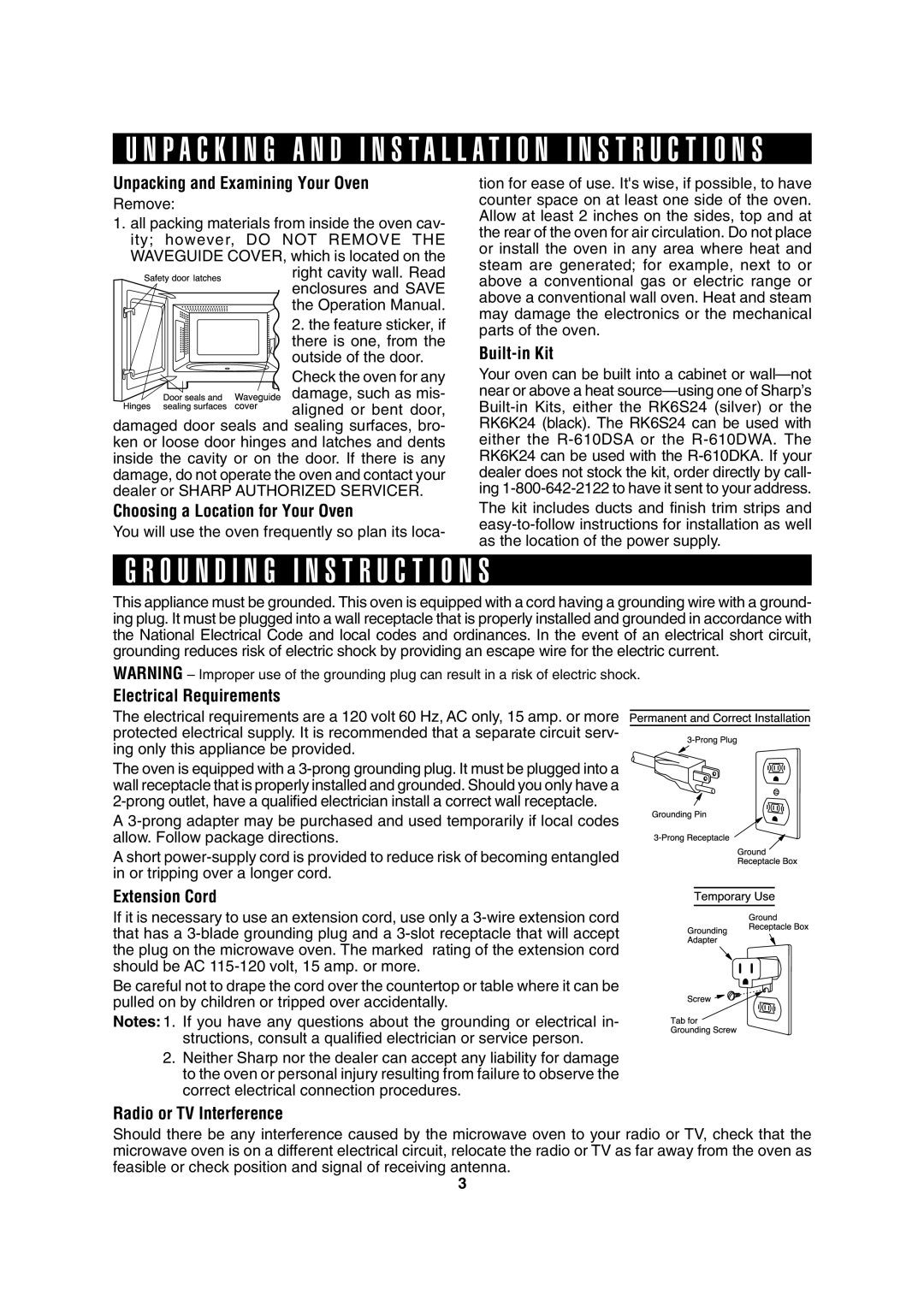
U N P A C K I N G A N D I N S T A L L A T I O N I N S T R U C T I O N S
Unpacking and Examining Your Oven
Remove:
1.all packing materials from inside the oven cav- ity; however, DO NOT REMOVE THE WAVEGUIDE COVER, which is located on the
right cavity wall. Read enclosures and SAVE the Operation Manual.
2. the feature sticker, if
there is one, from the
outside of the door.
Check the oven for any
![]()
![]()
![]()
![]()
![]()
![]()
![]()
![]()
![]()
![]()
![]()
![]() damage, such as mis-
damage, such as mis- ![]()
![]()
![]()
![]()
![]()
![]()
![]()
![]()
![]()
![]()
![]()
![]()
![]()
![]()
![]()
![]() aligned or bent door, damaged door seals and sealing surfaces, bro-
aligned or bent door, damaged door seals and sealing surfaces, bro-
ken or loose door hinges and latches and dents inside the cavity or on the door. If there is any damage, do not operate the oven and contact your dealer or SHARP AUTHORIZED SERVICER.
Choosing a Location for Your Oven
You will use the oven frequently so plan its loca-
tion for ease of use. It's wise, if possible, to have counter space on at least one side of the oven. Allow at least 2 inches on the sides, top and at the rear of the oven for air circulation. Do not place or install the oven in any area where heat and steam are generated; for example, next to or above a conventional gas or electric range or above a conventional wall oven. Heat and steam may damage the electronics or the mechanical parts of the oven.
Built-in Kit
Your oven can be built into a cabinet or
The kit includes ducts and finish trim strips and
G R O U N D I N G I N S T R U C T I O N S
This appliance must be grounded. This oven is equipped with a cord having a grounding wire with a ground- ing plug. It must be plugged into a wall receptacle that is properly installed and grounded in accordance with the National Electrical Code and local codes and ordinances. In the event of an electrical short circuit, grounding reduces risk of electric shock by providing an escape wire for the electric current.
WARNING – Improper use of the grounding plug can result in a risk of electric shock.
Electrical Requirements
The electrical requirements are a 120 volt 60 Hz, AC only, 15 amp. or more protected electrical supply. It is recommended that a separate circuit serv- ing only this appliance be provided.
The oven is equipped with a
A
A short
Extension Cord
If it is necessary to use an extension cord, use only a
Be careful not to drape the cord over the countertop or table where it can be pulled on by children or tripped over accidentally.
Notes: 1. If you have any questions about the grounding or electrical in- structions, consult a qualified electrician or service person.
2.Neither Sharp nor the dealer can accept any liability for damage to the oven or personal injury resulting from failure to observe the correct electrical connection procedures.
Radio or TV Interference
Should there be any interference caused by the microwave oven to your radio or TV, check that the microwave oven is on a different electrical circuit, relocate the radio or TV as far away from the oven as feasible or check position and signal of receiving antenna.
3
